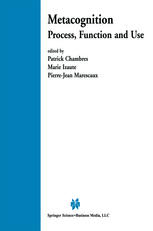

Most ebook files are in PDF format, so you can easily read them using various software such as Foxit Reader or directly on the Google Chrome browser.
Some ebook files are released by publishers in other formats such as .awz, .mobi, .epub, .fb2, etc. You may need to install specific software to read these formats on mobile/PC, such as Calibre.
Please read the tutorial at this link: https://ebookbell.com/faq
We offer FREE conversion to the popular formats you request; however, this may take some time. Therefore, right after payment, please email us, and we will try to provide the service as quickly as possible.
For some exceptional file formats or broken links (if any), please refrain from opening any disputes. Instead, email us first, and we will try to assist within a maximum of 6 hours.
EbookBell Team

5.0
80 reviewsNew Theory and Data on Metacognitive Monitoring and Control in Different Contexts and by Different Individuals Thomas O. Nelson University ofMary/and. USA This book, divided into several sections (each containing several chapters), is timely in reporting new theory and data that help refine what is already known about metacognition (defined as people's cognitions about their own cognitions). New data are reported about metacognition during learning (especially judgments of learning that occur soon after studying new items) not only in traditionally examined people such as college students but also in children and in Alzheimer patients. Data are also reported about metacognitive monitoring during the reading of text, not only in college students but also in children. The above situations focus on the acquisition of new items from lists or from texts. However, the book also includes a chapter reporting dataaboutmetacognitionduring problem solving. Besides the chapters on monitoring information in anticipation of future performance (sometimes called prospective monitoring), a chapter is included that offers data about the metacognitive monitoring ofthe retrieval of information from memory, where the emphasis is on the accuracy of retrospective confidence judgments not only in adults but also in children. This topic is ofwidespread interest both in traditional domains ofcognitive psychology and in applications to domains such as forensics, where eyewitness reports are crucial tojudicial decisions. The above topics pertain to aspects ofmetacognition involving the monitoringof one's own cognitions.